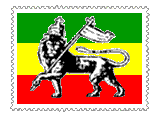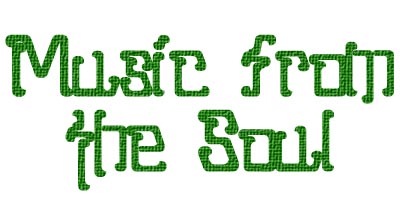 n spite of the spread of reggae all over the country, nobody takes from São Luís, at Maranhão state, northeast of Brazil, the title of capital of reggae. Its inhabitants proudly call the city of "Brazilian Jamaica". Nothing would be more appropriate, after all dozens of clubs, popular balls, radio programmes and the unquestionable preference of people make reggae the main dish in the musical menu of those from Maranhão. However it is not any reggae which people there prefer. Only that one called "raíz", the reggae of roots which had its golden age in the 70s in Jamaica. Names such as Gregory Isaacs, Culture, Gladiators, Eric Donaldson and Stanley Beckford were worshiped and dragged crowds to the shows they made in the city. It was in this atmosphere that Tribo of Jah, the most authentic Brazilian reggae band, was created.
n spite of the spread of reggae all over the country, nobody takes from São Luís, at Maranhão state, northeast of Brazil, the title of capital of reggae. Its inhabitants proudly call the city of "Brazilian Jamaica". Nothing would be more appropriate, after all dozens of clubs, popular balls, radio programmes and the unquestionable preference of people make reggae the main dish in the musical menu of those from Maranhão. However it is not any reggae which people there prefer. Only that one called "raíz", the reggae of roots which had its golden age in the 70s in Jamaica. Names such as Gregory Isaacs, Culture, Gladiators, Eric Donaldson and Stanley Beckford were worshiped and dragged crowds to the shows they made in the city. It was in this atmosphere that Tribo of Jah, the most authentic Brazilian reggae band, was created.
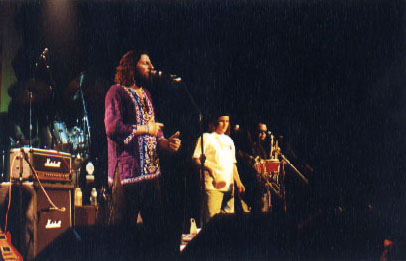
Foto: Leo Vidigal
Tribo of Jah has a history marked by the overcoming of difficulties, thanks to the persistence and strength of its members. Fauzi Beydoun, from São Paulo, landed in Maranhão in the mid-80s as an employee of a multinacional. As a free-lance musician in love with reggae, he started by presenting a program in a local radio, until he decided to quit his job and found a band. Fauzi himself remembers: "The members of the Tribo were students of São Luís's boarding school for blind people. They were poor kids, and were awoken to music improvising toy instruments before they started to play in school parties. As they were a very in tune and harmonious band they ended by calling the attention of a "group owner" (Note: somebody who owns the instruments and pays musicians to play) who invited them to play in balls. At this time, around 83, the reggae set was the great moment of the band. In 86 I decided to form a band and go to buy some equipment. When I arrived at the place to see the instruments, the men were rehearsing. I recognized them and didn't know that if I bought the equipment they would be unemployed. Then I introduced myself and said that I was buying the instruments and if they wished we could start a band and work together... And that's how everything started." (Interview to Massive Reggae magazine).
However the beginning of the band's history, like the rest of it, was surrounded by difficulties. People didn't believe in the band, the instruments were poor and the public from Maranhão was used to the potency of the sound-system and to the purely Jamaican reggae. The work started to be known as a good one when the first record, REGUEIROS GUERREIROS, was released in 91, produced and financed by Fauzi himself. In the same year Gregory Isaacs, the greatest idol of people from Maranhão, was going to make some shows in Maranhão but because of some problems he had he arrived in the city without a band to accompany him. The Tribo was then called to play with him and did it brilliantly to an audience estimated in 20.000 people.
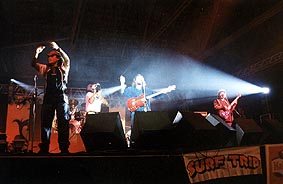
From then on the band was on the road, visiting the states from north to south in all possible manners and attracting a faithful public. The effort of the band was being rewarded little by little. In 1994 they managed to release its second record, ROOTS REGGAE, once again an independent production. With this record the band's work started to be better known by the public. A small label from São Paulo released a CD also called ROOTS REGGAE with the songs from the band's two records but didn't make any promotion which was made by the band itself. In 95 the Tribo made a remarkable presentation in Jamaica, at Sunsplash. All their struggle ended in a contract with another independent label, this time in Rio de Janeiro.
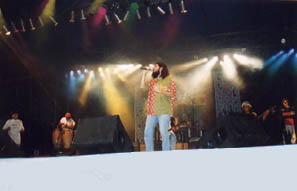
Tribo de Jah at Reggae Sunsplash '95
(Geraldo Carvalho)
The CD ROOTS REGGAE was released again and the band managed to get a better production for its third record, RUÍNAS DA BABILÔNIA (Indie/Brazil). Released in 96 it has been up to now the most refined work of the band which has shown a great evolution such in terms of execution as in terms of the compositions. Unfortunately, the great radios keep on ignoring the Tribo's music, as it is common the"jabá" scheme, that is, only those who pay underneath for the songs are played. The Tribo knows that and is still steady in its way, making shows to promote its authentic roots reggae and spread their message of love and unity to the people.
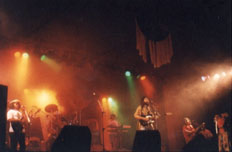
Recife, Brazil
(Eduardo Noronha)
Its struggle has shown good results. They played in Argentina and get more exposure in the media, with many appearances in TV shows. The vocalist and main composer Fauzi has also released his solo cd which was recorded in San Diego, Califórnia, and was produced and arranged by George 'Fully' Fullwood. REGGAE'N BLUES (Indie/Brazil) is a nice work by a reggae warrior. Fauzi played with a great team of musicians that include names like Santa Davis, Tony Chin and Fullwood and shows his own style developed in a decade on the road. But the group got together again to release their fourth work, REGGAE NA ESTRADA, at the end of '98. The struggle continues.
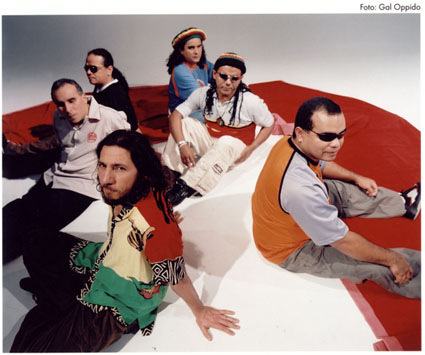
The Tribo of Jah is composed by Fauzi Beydoun (vocal, eletric guitar), Zé Orlando (vocal and backing vocal), Achiles Rabelo (bass and backing vocal), João Rodrigues (drums), Neto (eletric guitar and backing vocal) and Frazão (keyboard and backing vocal). But for Fauzi, all the others are blind. Maybe because of that the sound of the Tribo lets overflow sensibility. The reggae they play comes from the soul and is a perfect musical bridge between the Jamaica of the 70s and Maranhão.

